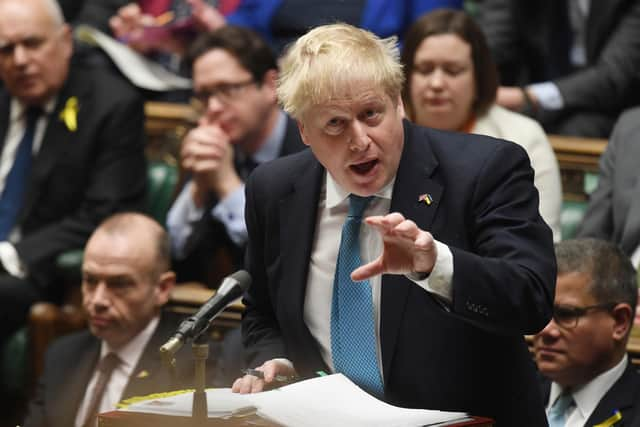Ignore the Russian bots and anti-Boris bellyaching – Britain is leading opposition to Putin - Brian Monteith
The intelligence community of both the US and UK were repeatedly warning European leaders war was imminent. The EU circus played it down, its ringmasters thought they had it under control and had convinced Vladimir Putin it would be unwise. President Biden said on Tuesday 17th February the invasion was about to happen. Social media came alive mocking him and joking he was just a delusional old bloke havering. On the 24th he was proven right.
The Russian tanks rolled and real people, not imaginary statistics started to die. Nobody is laughing at Joe Biden now.
Advertisement
Hide AdAdvertisement
Hide AdWe are now eleven days on and while some Ukrainian towns and cities have fallen, especially along Ukraine’s south eastern coast, the spirited and brave resistance by the Ukrainian people has shown Russia’s advantage of massive numbers is not always enough. Superior technology in military hardware, an intimate understanding of local terrain and weather, cunning ambush tactics that play to Ukraine’s strengths – and a self-belief amongst Ukrainians fighting for their soil that Russian conscripts cannot ever match – are all contributing to a hard lesson for the Russian military.


Quietly, in the background, the role of the UK in defending Ukrainian sovereignty has been vital. Short of putting troops in the field, or aircraft in Ukrainian skies – which Boris Johnson was right to rule out because of the escalation it would guarantee and where that could inevitably lead – the British military has led the West’s response to Putin’s belligerence. Since 2015 under Operation Orbital 100 British military specialists have trained some 20,000 Ukrainian military forces, including specialist snipers.
The reported death of Russia’s Major General Andrey Sukhovetsky and other military commanders from Ukrainian sniper fire shows the importance it can have for defenders significantly outnumbered. All British military were withdrawn by mid-February.
Earlier in January 2,000 of the latest British-Swedish NLAW anti-tank missiles were transported to Ukraine by the RAF, travelling north of German airspace to avoid the embarrassment of being denied entry to fly through it. Again, training was provided. Its effectiveness is now being hailed as a crucial component in slowing down the Russian advance. Forsaking its famous neutrality Sweden has decided to deliver 5,000 more missiles.
Yet for all the assistance the UK has been giving Ukraine for the last seven years there are people who hate Boris Johnson and Brexit so much, like there’s a tapeworm in their brain, they cannot help themselves from comparing Britain, falsely, as being a straggler behind the EU in helping the Ukrainian people.
Be it military kit, sanctions, refugee relief, international diplomacy – you name it and Britain has not been doing enough. I’m sorry to break the news but Prime Minister Johnson has been taking the lead when others would rather have ignored the Russian threat.
Previously the German Government worked to prevent other countries providing German equipment and ordnance being sent by Baltic states to the Ukraine. Only now, belatedly, has Chancellor Scholz committed to send anti-tank missiles – only for many of them to be found to be duds, so long have they been in storage.
On economic sanctions it was Boris Johnson who was literally thumping the table demanding Russian banks be expelled from Europe’s SWIFT payments messaging system. Germany, Hungary and Italy were eventually shamed into agreeing – only for it to come out the EU’s commitment is to expel only seven Russian banks that account for only 25 per cent of its banking sector. Thanks to Brexit, Boris Johnson has gone further, including Russia’s largest bank, Sberbank, in our sanctions.
Advertisement
Hide AdAdvertisement
Hide AdThe focus of Johnson’s critics has been on the number of “oligarchs” personally sanctioned, ridiculing a number initially put as low as six. This was intentionally partisan – the UK has sanctioned 228 individuals, entities and subsidiaries since the invasion. Demands for “oligarch” Alexander Temerko to be sanctioned showed the sheer anti-Tory bile behind these demands – Temerko, who donated to a Tory MP’s election campaign is a Ukrainian citizen and British national who is a critic of Putin.
More importantly, Britain has frozen significantly more Russian bank assets than any other country – £258.8 billion against £240 billion by the US and only £33.8 billion by the EU. Meanwhile both the US and UK have stopped clearing transactions in dollars and Sterling but the EU continues to allow Russian clearing in Euros.
The reality is when it comes to economic sanctions other countries have been dragging their feet and are now playing catch-up.
In the last eighteen months Russian exports to the EU have doubled yet in the same timeframe UK exports to the EU have increased by 3.6 per cent. Reflecting no doubt, the growth in EU countries buying Russian energy and putting themselves under blackmail. Russian gas is 7 per cent of British consumption but 55 per cent of German demand. Johnson should now ban the importing of Russian gas and order it is ought from Qatar, meeting any difference in cost as a mark of our support for Ukraine’s independence.
I welcome the EU’s economic mobilisation against Russia, but there is no mistaking it is reluctant and late.
I’ll leave the last word with the Ukrainian Ambassador, Vadym Prystaiko, who was given a standing ovation in the House of Commons last week and has nothing but praise for Britain. His words are clear and we should take comfort in them, “Your nation is so much at the forefront of the international effort that sometimes I think: ‘Where are the rest of them?’”
Slava Ukraini.
Brian Monteith is editor of ThinkScotland and a former member of the Scottish and European Parliaments.
Comments
Want to join the conversation? Please or to comment on this article.

